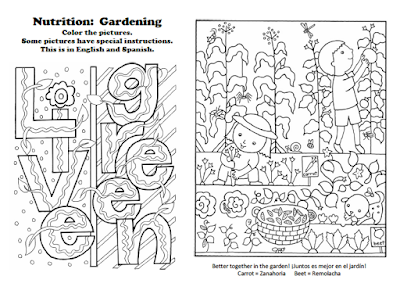Mission of Healing 2021: April's Theme is Nutrition and Family Gardens
A Brief Introduction
If you have been following the story of the Mission of Healing 2021 with the northern micro-region churches of the Salvadoran Lutheran Church, you know that this year we went virtual! Each month we are producing video and printed education materials related to a particular theme. You can dive right into the month of April, or if you would like a little background first, you might like to explore these stories.
Mission of Healing 2021: What's the Plan?
Mission of Healing 2021: Personal Hygiene
Mission of Healing 2021: Community Hygiene
A few of the leaders shared photos from their first small group learning activities. We put those into a celebratory video to share with everyone in the northern churches to build enthusiasm for this year's program.
Mission of Healing in Action
In El Salvador, the rainy season begins in May. April is the time to get the soil ready and begin the planting process. It seems natural to sync up with the rhythms of Mother Earth and focus on the themes of Nutrition and Home Gardening in April.
We produced 3 videos of our own, and shared 2 videos which illustrate some simple ways in which to make compost in small spaces for small home gardens or food plants grown in pots. In 2020, our nutrition charla (mini-workshop) focused on eating natural foods and getting the most nutrition we can out of the foods we grow or purchase. We tried to include these ideas in our video, Nutrition: Tips in the Kitchen.
Nutrition: Tips in the Kitchen
Themes include Eating the Rainbow, Eating Traditional
Healthy Foods of our Ancestors and making broth from the
"garbage" parts of the vegetables we grow or purchase.
To accompany this video, we created handouts using materials from hesperian.org. Many of the Spanish booklets under the category "donde no hay doctor" (where there is no doctor) are free to download and reproduce for use in an educational setting.
 |
| This handout helps families to identify which local and inexpensive foods are rich in nutrients which Salvadorans often lack in their diets, such as iron, B vitamins and protein. |
To help children get involved in home garden projects, and to follow up on some of our community hygiene and recycling themes from March, we created this fun video which shows different ways that recycled plastic bottles can be used in the garden. I took many of the photos in this video at a cafe in San Salvador where we like to hang out for afternoon coffee.
Go ahead! Learn a few words in Spanish and learn from the pictures!
By chance, on a Saturday morning late in March, the Salvadoran Lutheran Church youth had a workshop all about creating home gardens and compost. We gathered a few photos from that event to make another video about home gardening. This is really good example of how interconnected the ministries of health, care for creation and youth/family ministries can be! This video celebrates the work of the youth and encourages families to put these techniques into practice.
Family gardens! Whether you live in Wisconsin or El Salvador,
you can plant seeds and grow something to eat!!
The Care for Creation Ministries leaders really encouraged us to talk about composting, as a great topic to promote family health (eating organic foods), community health (managing garbage), and planet health (reducing toxins in the environment). We found two videos which are really easy to follow and illustrate two composting techniques which can be done in small spaces. The first one shows how to compost in a recycled plastic bottle right next to whatever plant you are growing in a pot. The second one was made by a physician who talks about making compost in a trash can which she keeps in a corner in her bathroom or on the patio. These are great tips for city composters!
Even if you just watch a few moments of this,
you will catch the enthusiasm!
Enjoy this one with Doctor Lupita
To accompany our garden and compost videos, we created coloring books for kids and compost diagrams for adults. The photo below is of the English cover page for the coloring book. All of the interior pages are in both Spanish and English.
We also made our prayer card for the month.
We definitely will include more garden talks in our future in-person Mission of Healing Wellness Fairs. It will be so much fun to hand out seeds, to share demonstrations, and to learn the tips which grandmothers and grandfathers in the rural communities have for growing all kinds of nutritional plants in their small spaces.





Comments
Post a Comment